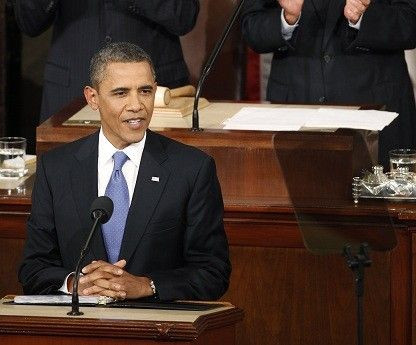Obama to Propose 28% Corporate Tax Rate

(Reuters) - The Obama administration on Wednesday will propose cutting the top tax rate for corporations to 28 percent, and pay for it by eliminating dozens of tax loopholes companies now use to lower their rates, a senior administration official said.
Chances of a deeply divided Congress revamping a tax system regarded as convoluted across the political spectrum seems remote in an election year, but the announcement is certain to fuel debate in the run-up to November's elections.
The plan, over a year in the making, is President Barack Obama's first official foray into overhauling the tax code, which most experts believe badly needs a revamp after years of being loaded up with special provisions.
The centerpiece is a cut in the top corporate rate - now at 35 percent, among the highest in the industrialized world. That will appeal to businesses, which gripe that the current U.S. rate puts them at a competitive disadvantage.
Controversy will erupt when officials lay out which loopholes they want to cut.
The proposal makes a special carve-out for manufacturing - cutting that tax rate to 25 percent - and proposes a minimum tax on profits earned in low tax countries.
With deficits running about $1 trillion, the administration official said the plan will not add a dime to the deficit.
That means any tax revamp will create winners, companies whose tax rates go down, and losers who now benefit from the very loopholes Obama wants to trim. This will set up a fierce fight among lobbyists defending their tax breaks, when a proposal finally makes it to Congress for debate, which seems unlikely before November at the earliest.
Administration officials told reporters on Tuesday the Treasury Department would put out a corporate tax reform plan on Wednesday. The Obama plan will follow such principles as fairness that the president set out in his State of the Union address to Congress last month, the officials said.
After the presidential and congressional contests are decided in November, a number of major tax and budget issues will converge on Washington and new momentum for comprehensive tax reform may follow.
Treasury Secretary Timothy Geithner told a Senate committee last week that dozens and dozens of tax loopholes were being targeted for closure, but that some tax incentives would be kept for creating and building stuff in the United States.
Analyst Greg Valliere of Potomac Research Group called the timing a cynical ploy given that Republican presidential hopeful Mitt Romney is expected to release his own tax reform plan shortly, as he struggles to fend off rival Rick Santorum for the Republican nomination to face Obama in November.
The administration will strike first, unveiling a plan that has virtually no chance of winning enactment this year, Valliere said.
The last major rewrite of the tax code came in 1986 under Republican President Ronald Reagan, who raised corporate taxes. Talk of tax reform has dominated the presidential campaign.
Romney on Tuesday called for a flatter, fairer and simpler tax code. He is scheduled to make a major economic speech on Friday in Detroit. Details of his tax plan may emerge before then.
FISCAL TREMORS CONVERGE
Corporations are clamoring for a cut in the top rate of 35 percent. While that level is one of the world's highest, few U.S. corporations actually pay it due to assorted loopholes that make their effective tax rates lower.
Everyone agrees on the basic principle of lowering rates in exchange for eliminating loopholes, said Dean Baker, co-director of the Center for Economic and Policy Research, a think tank.
However, I think it is important that the target be some increase in tax revenue. While we are at the top in marginal tax rates ... we rank near the bottom in effective average taxation.
Republican Representative Dave Camp, chairman of the U.S. House of Representatives tax-law writing Ways and Means Committee, wants to slash the top corporate rate to 25 percent.
Obama last week unveiled a $3.8 trillion budget-and-tax proposal that called for aggressive government spending to boost the economy and for higher taxes on the rich.
On Friday, Congress approved extending a payroll tax cut through the end of 2012. Its expiration will coincide with several other fiscal earthquakes: the expirations of individual tax cuts enacted under President George W. Bush, and $1.2 trillion in automatic budget cuts across all government programs imposed as part of last year's deal to raise the debt ceiling.
After these events and others, analysts said, thorough tax reform may be a realistic prospect. For now, they said, tax proposals will largely amount to political messaging.
--
© Copyright Thomson Reuters {{Year}}. All rights reserved.





















